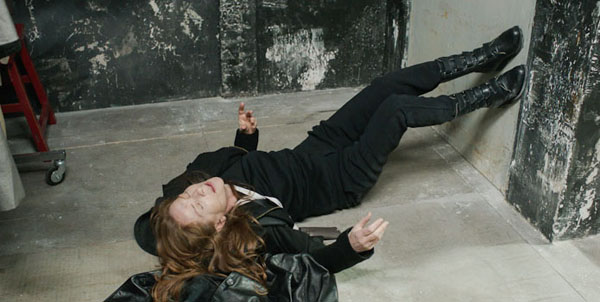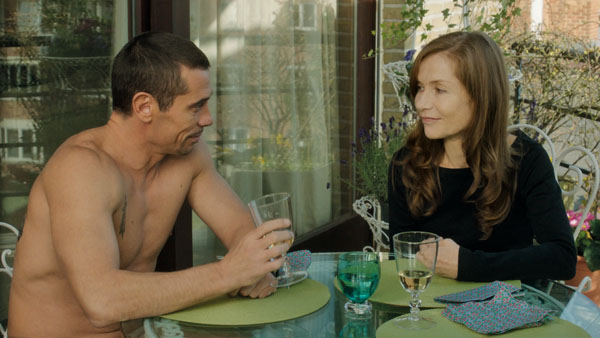“Catherine Breillat makes her most personal film yet with Abuse of Weakness (Abus de faiblesse), a largely autobiographical account of the filmmaker’s stroke, which left her partially paralyzed, and how a notorious con man she had lined up for her first post-stroke film project swindled her out of a lot of money.” Boyd van Hoeij in the Hollywood Reporter: “Based on Breillat’s book of the same title, Abuse of Weakness (a French legal term) casts Isabelle Huppert as the film director Maud, Breillat’s alter ego, and French rapper Kool Shen as Vilko, a character based on Christophe Roconcourt, the man who managed to get several hundred thousands of dollars from Breillat for business ventures and the repeated promise he would eventually pay it all back. Like in all of the director’s work, psychologically reductive readings of the characters are absent, though intriguing performances give audiences a way into the material.”
“Rigid, frigid, and icy to the core, the re-enactment is less scandalous and perhaps more perversely self-castigating,” writes Nicholas Bell at Ioncinema, “but what supersedes all aspects of both the film’s origination and directorial intent is another fascinating performance from Isabelle Huppert, the stand-in for Breillat’s on-camera persona and perhaps the warmest rendition of an adult female to appear in her filmography yet.”
“While her body is inexplicably and uncontrollably attacked through the stroke,” writes Danny Kasman in the Notebook, “Maud seems to choose to be enfolded, with a wry detachment and often genuine pleasure, in her being by this strange man, so clearly a mountebank. In this way, the simple presence of the conman is a physical manifestation of both the woman’s inner strength and handicap, just as her permanent limp and tightly gripped left hand are. All this is held behind the almost demure surface of the film, which keeps its characters interiority a secret one cannot solve, and makes Breillat’s lucid confession a sympathetic, honest appeal of bewildered abashment.”
“Huppert plays a very different Breillat surrogate than Anne Parillaud’s manic caricature from Sex Is Comedy (2002),” notes Ben Kenigsberg at the AV Club. “The movie is interesting to think about as another of the Anatomy of Hell director’s power-struggle portraits, even if its conceit—by design—leaves the question of how the filmmaker allowed a known operator to bilk her out of so much money unresolved.”
“Kool Shen brings a degree of charisma to the incorrigible Vilko, but it is Huppert who remains the star attraction in this pensive cinematic confessional,” writes Allan Hunter in Screen Daily.
“Huppert’s face is a marvel, trouble always broiling under its glassy surface,” agrees Nathaniel Rogers. “Abuse of Weakness has a fine beginning and a killer ending—too bad there’s no movie in the middle. It’s all just a series of check-signings and a very vaguely observed relationship that’s never truly examined by the protagonist living it or the director filming an actress reliving it. It’s as if Breillat is determined to make the same mistakes all over again, botching her own would be exorcism.”
“Between its perverse power games and co-dependent sadomasochism, the almost frigidly unsentimental pic seems an ideal double bill with Roman Polanski’s Venus in Fur,” suggests Variety‘s Peter Debruge. “In the press notes, Breillat explains that she cut long scenes of physical therapy from the film, and though difficult-to-watch depictions of the initial stroke and subsequent epileptic attacks cement our allegiance with Maud, it is the character’s formidable strength—not her weakness—that comes through loud and clear.”
Abuse of Weakness screens in Toronto‘s Masters program. Then, it’s on to New York.
Updates, 9/11: “The message in Catherine Breillat’s Abuse of Weakness is about the incomprehensibility of the self,” writes R. Emmet Sweeney in a dispatch to the L. After the stroke, “even laughing requires a reeducation of her facial muscles. Every ‘ha’ Huppert utters feels artificial, an act of muscle memory rather than from the spirit. Filmed in ascetic, static frames, usually blanketed in white, Huppert’s whole life becomes a hospital. While aroused by getting men to serve her, almost as slaves, she is still at their mercy…. Abuse of Weakness would make an ideal double bill with Claire Denis’s The Intruder, another tale of a body turning against itself.”
“Whatever the motivations of these characters…, one’s reaction to the film will arguably hinge on one’s reaction to its final scene of devastating self-revelation,” writes Kenji Fujishima at In Review Online. “‘It was me… but it wasn’t me’ is Maud’s refrain, which she repeats while Breillat’s camera stares unforgivingly. One could read this as a dodge on Breillat’s part, rubbing our nose in a refusal to psychologize à la the final scene of Cristi Puiu’s Aurora.”
Update, 9/17: Maud and Vilko’s relationship is “explicitly not a romantic bond,” notes Nicolas Rapold at Film Comment. “But one exchange about her coffee-table book of Japanese S/M photography hints (bravely, I think, if subtly) at another subconscious dynamic.”
Toronto 2013 Index. For news and tips throughout the day every day, follow @KeyframeDaily on Twitter and/or the RSS feed. Get Keyframe Daily in your inbox by signing in at fandor.com/daily.





